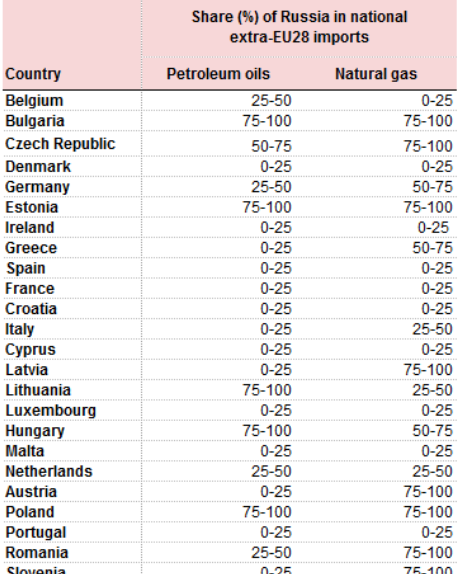And again, how is that comparable to the 35% for Germany?We were talking about the United States, where else do you think that 8% comes from? You were the one who cited the EIA figures in your opening post.
Because 8% of import (most supply is domestic anyway, so that would be even less than 8% of supply) doesn't make USA particularly reliant on that supplier, while than 35% of import for Germany does, which is why all these odd schemes to change the supplier slowly over the years now are necessary.So is Germany, so why does the U.S. get a pass but Germany doesn't?
USA? So, any evidence that it was US government buying the Russian oil?Indeed I said that, and I've explained three times now that Germany had underlying logic to do what it did while the U.S. didn't; it makes no sense to attack the former while giving the latter a pass. I have no reason to feel ashamed for holding a consistent ethic in applying standards, I would rather avoid in engaging in flagrant hypocrisy as you are here.
Or are you yet again indirectly complaining that USA has free market and doesn't have time travel to check which countries is it going to sanction in the future?
Sorry, but those are only theoretical average costs of shipping (they can vary individually by the need to use certain ports or canals, whether its a regular route or not and so on), i would also like to remind you that Russian oil and gas are generally not extracted anywhere near Moscow of all places, but in much further away places, some with absolutely terrible conditions for building and maintaining infrastructure, as such, it's yet again an attempt to bamboozle everyone with a quarter answer.To move oil by ship:
The price for shipping oil using tankers varies. The cost for oil tankers in 32,000-45,000 DWT is US$43 million, while the 80,000–105,000 DWT costs $58 million. 250,000–280,000 DWT oil tankers rakes in $120 million for shipping oil. Moreover, tankers cost $40K-$70K per day for shipping 250k-2000k barrels. So, mathematically, the cost comes down to $1.00/barrel/1000 mi. after including all costs.
To move oil by pipeline:
Gas can be transported by pipeline or liquefied and then shipped by sea on special liquefied natural gas carriers. The cost of transporting 1000 cubic feet of gas 1000 miles by pipeline is approximately $.50. The cost of transporting 1000 cubic feet of LNG a distance of 1000 miles by sea is approximately $.30. However, the cost of liquefaction and regasification is approximately $1.40 per 1000 CF. Thus, for natural gas, transporting the energy equivalent of one barrel of oil a distance of 1000 miles costs $3.00 by pipeline and $10.20 if it is liquefied and transported by sea. By contrast, the cost of transporting a barrel of crude oil is approximately $.10 per thousand miles.
So, oil tanker is $1 per 1,000 miles vs .10 cents per thousand miles via pipeline. With this in mind:
Moscow to Berlin: 1,137 miles
Ras Tanura to Hamburg: 8,763 miles
Russia wins out no matter how you slice it in economic logic.
Secondly, shipping, especially for oil, as your source gives, is an absolutely miniscule part of the total price, the price sometimes varies by more in one month than the cost of shipping.
Why the decision to choose the imprecise term prone to misinterpretation over the precise one?There is no difference in these terms in this usage; imports are supplies, and supplies are from imports. If I said something like total supply, sure, but I didn't. If you feel otherwise, please explain why with citations as you asked me to do above.
Absolutely not, the amount absolutely does matter, the scale is what makes one strategically reliant on a supplier, small amounts don't, relatively large ones do, and of course the money involved are also proportional to the amount.No, the people arguing Germany was bad for choosing its most economical option are, especially when they fail to castigate the United States for also importing from Russia. The amount does not matter, the end result is still lining Russian pockets if that this the thing you are opposed to.
Yeah, theoretical transportation costs, not the actual total price paid, sure, whatever.Sure, but the degree of dependence wasn't my argument, however.
In which case, defer back to the numbers I provided on transportation costs, if you are wanting to insist on measuring things on numbers.
Because yet again you said something absolutely and measurably untrue that just so happens to help grind your axe.The numbers have already been provided, by both myself and you, I'm not sure why you are attempting to spin this as a gotcha when they were never under debate. What was, from my very post and explained to you multiple times now, was the consistent application of condemnation and the equally economically illiterate refusal to consider the numbers, as you put it, as they pertain to Germany's needs.
The degree of dependence absolutely matters, no one gives a shit about all the countries that bought some small amount of oil from Russia back when it was not sanctioned, the condemnation of Germany was for its long running policy of making itself dependent on Russia as its main supplier over a long time, to a point where it could be threatened by the possibility of losing that supplier.If Germany was wrong for importing oil from Russia, so was the United States. The degree of dependence does not matter, because the entire argument is made on a moral judgement, not an economic one. If you want to make an economic case, defer back to transportation costs.
And there you go again, with axe grinding over facts, i just caught you once ignoring Germany having the seventh largest coal reserves in the whole world (which is more than some notable coal producers like Poland, Ukraine and South Africa) for the sake of making up an argument, yet you come back to trying push this open lie on people.Second, condemnation of Germany ignores the costs and resources available to them. They don't have coal, gas, uranium or oil of their own,
So fucking what? Germany is not the only country in the world in that situation. How do you think all the other countries without major domestic energy resources (as in most of EU countries that weren't having Russia as their dominant supplier) do it?and their own geography plus material constraints limits going Green. This meant they would always need to import this from somewhere, and that somewhere, on the most efficient basis, was Russia. I've covered the transportation costs of Oil, would you like me to do the same for Natural Gas?
And stop trying to mislead people with average transport costs as opposed to total import prices.
Or better yet, try arguing on the point of end consumer energy prices in Germany, that's gonna be more interesting.
There are also other routes Kazakhstan can ship out its ore if need be, also the author of your source thinks Caspian Sea is land apparently.Here you go:
Russia has the world's largest uranium enrichment complex, accounting for almost half the global capacity, but it is a relatively small uranium producer with only six percent of the global supply in 2020. In fact, Russia mines less uranium than it exports to the United States and the EU—for instance, in 2020, it mined 2,800 tonnes while exporting 3,100 and 2,500 tonnes to the United States and the EU, respectively. This is possible because most of the uranium Russia exports is bought from Kazakhstan—a country that is landlocked and ships its uranium to Europe and the United States through Russia. Kazakhstan is the world's largest uranium producer with 19,500 tonnes in 2020.
And yes, the uranium Russia reexports from other countries is already accounted for in the 14% in my previous source, because as proven by the above quote, Russia couldn't possibly meet even the 14% with domestic mining. The much larger imports from Kazakhstan are separate for a reason.
Last edited:

/cloudfront-us-east-2.images.arcpublishing.com/reuters/D5QPYYAKBJJSJMFDWXI5KB5MXA.jpg)



